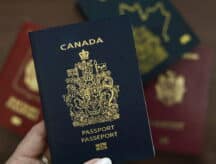IRCC looking to tackle Express Entry backlogs before resuming FSWP and CEC invitations
IRCC is holding off on inviting FSWP and CEC candidates so that it can tackle its backlogs.
This is revealed in an internal briefing memo that CIC News requested and successfully obtained from the department.
Get a Free Canadian Immigration Assessment
Although the memo is heavily redacted, it contains key insights on Canada's Express Entry operations.
The memo begins by stating that Immigration, Refugees and Citizenship Canada (IRCC) stopped Federal Skilled Worker Program (FSWP) invitations in December 2020 to pursue a strategy of "aggressively" inviting Canadian Experience Class (CEC) candidates and candidates under the Temporary Resident to Permanent Resident (TR to PR) pathway to support its 2021 immigration targets.
The memo states "this strategy led to significant inventory growth, creating a backlog of applications, and processing times in excess of the service standards for all economic categories."
As reported by CIC News last week, IRCC's backlog stood at 1.8 million applications as of October 2021. This includes permanent residence, temporary residence, and Canadian citizenship applications. The backlog has grown from 1.5 million applications in July 2021. The statistics show there were nearly 140,000 Express Entry permanent residence applications awaiting processing as of October 27, 2021.
It appears that some progress is being made on reducing Express Entry application backlogs. The internal IRCC briefing notes the backlog was at about 108,500 as of the date of the memo, September 3, 2021.
This suggests the Express Entry backlog decreased by about 8,500 applications over the period between September 3 and October 27 of this year.
The briefing mentions the backlog of Express Entry candidates was 62,450 candidates at the same point last year (i.e., September 2020). This means it has nearly doubled amid IRCC's strategy to focus on providing permanent residence to candidates in Canada.
IRCC states in the memo that "Adjusting to meet the Afghanistan resettlement objectives has created the need for trade-offs in the Spousal Sponsorship category, CEC, and the TR2PR program. As a result, the Department now anticipates concluding 2021 with a PR [permanent residence] inventory in excess of 760K persons, with 360K in the economic class."
It is unknown if IRCC's forecasts have changed. As of October 27, the permanent residence inventory stood at nearly 550,000 applications, of which over 255,000 fell under the economic class. Given the slight decline in the Express Entry backlog between September and October, it is possible that IRCC has revised its internal forecast on backlogs and no longer expects them to be as large as indicated in the September 3 memo.
IRCC notes in its memo it will need to cut the Express Entry backlog by "more than half" in order to achieve its Express Entry processing standard of six months or less.
The memo concludes by stating senior IRCC officials will return to the department's highest ranking civil servant (i.e., non-political employee), the Deputy Minister Catrina Tapley, in November 2021 with a plan for Express Entry intakes throughout the remainder of 2021, and early 2022, once there is a better sense of the composition of immigrants IRCC will look to target in 2022.
Get a Free Canadian Immigration Assessment
About Express Entry
IRCC operates the Express Entry system to manage applications for the Federal Skilled Worker Program (FSWP), the Canadian Experience Class (CEC), and Federal Skilled Trades Program (FSTP). Express Entry is the main way Canada welcomes economic class immigrants.
Candidates who are eligible for any of the three programs can create profiles on IRCC's website. They receive a Comprehensive Ranking System (CRS) score based on their human capital characteristics such as their age, education, language skills, and work experience.
Prior to the pandemic, IRCC held Express Entry draws approximately every two weeks and invited the highest scoring candidates to apply for permanent residence. Invited candidates had 60 days to submit their completed permanent residence applications to IRCC. IRCC then aimed to process applications within its service standard of six months or less for most candidates. FSWP candidates were the lead recipients of Invitations to Apply (ITA) for permanent residence, followed by CEC candidates.
The pandemic has changed things, however. This year, IRCC has only invited CEC and Provincial Nominee Program (PNP) candidates to apply for permanent residence, even if they were not the highest scoring candidates among all candidates in the Express Entry pool. Moreover, IRCC is not currently able to commit to maintaining its processing standard of six months due to the pandemic.
The CEC is a popular program among former international students and foreign workers who have at least 1 year of professional work experience in Canada. The PNP exists to address the local labour market needs of provinces and territories across Canada. If an Express Entry candidate also meets the criteria of a PNP stream, a province can invite them to apply to their PNP. If the candidate accepts the invitation, they receive an additional 600 CRS points, which essentially guarantees they will receive an ITA under Express Entry.
The focus in 2021 on only inviting CEC and PNP candidates is to help IRCC achieve its goal of landing 401,000 new permanent residents in 2021 as set out in its Immigration Levels Plan 2021-2023. IRCC's focus on CEC and PNP candidates is guided by a two-fold rationale.
First, CEC candidates are mostly in Canada and hence less likely to be impacted by COVID-related disruptions that would impede their ability to gain permanent residence, and hence undermine IRCC's ability to land 401,000 immigrants this year. Second, IRCC views PNP draws as necessary to support the labour market needs of Canada's provinces.
This year, IRCC has held 33 PNP-specific draws, inviting 17,785 candidates in all. Meanwhile, there have been 27 CEC specific draws, resulting in 133,868 invitations.
The last CEC draw took place on September 14. The IRCC briefing note indicates the pause in CEC draws is to allow IRCC to manage its current Express Entry backlog.
FSWP candidates have been the ones most negatively impacted by the above temporary policy changes. In an email to CIC News, IRCC confirmed there were almost 165,000 FSWP eligible candidates in the Express Entry pool as of October 25, 2021. This means they represent over 85 per cent of Express Entry candidates currently in the pool.
Get a Free Canadian Immigration Assessment
© CIC News All Rights Reserved. Visit CanadaVisa.com to discover your Canadian immigration options.
- Do you need Canadian immigration assistance? Contact the Contact Cohen Immigration Law firm by completing our form
- Send us your feedback or your non-legal assistance questions by emailing us at media@canadavisa.com







